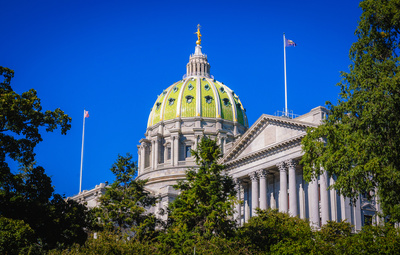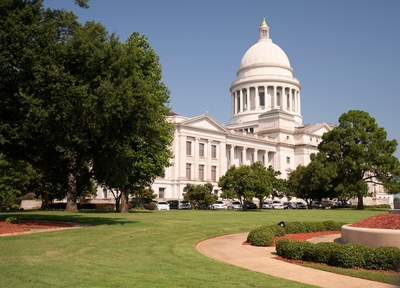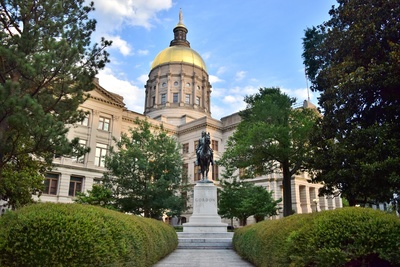
Legal
How State Lawmakers Regulated Marijuana, Hemp, and Kratom in 2025
February 5, 2026 | Kerrie Zabala, Michael Greene
May 15, 2025 | Sandy Dornsife

Key Takeaways:
From the beginning of Donald Trump’s second term, the President has made the deportation of undocumented immigrants a top priority. President Trump, however, has faced stark resistance from a number of states seeking to provide a sanctuary against the administration’s stringent policies. Needless to say, a significant amount of litigation has ensued, and this month, a new Executive Order entitled “Strengthening and Unleashing America’s Law Enforcement to Pursue Criminals and Protect Innocent Citizens” was issued as the direct result of a unique case in the state of Washington, highlighting the continued conflict over the obligations, or lack thereof, of the states regarding federal immigration policy.
Legal precedent has long held that the federal government cannot require states and localities to carry out its immigration policy. In Printz v. United States, the Supreme Court majority held that the Tenth Amendment’s anit-commandeering doctrine prohibits the federal government from issuing "directives requiring the States to address particular problems or to…administer or enforce a federal regulatory program.” While state and local authorities are under no legal obligation to enforce federal immigration laws, several states and cities have codified their resistance to such federal legislation by passing “sanctuary” laws. These laws expressly limit the level of cooperation that the state government and its localities can provide to federal efforts to enforce immigration policy. States with the highest level of immigrant protections include California, Colorado, Delaware, Illinois, Maryland, New Hampshire, Massachusetts, Oregon, and Washington.
Without this authority to compel action by the states, the federal government has turned to the withholding of federal funds as a means to achieve state cooperation, however, not all such actions are permissible. The Supreme Court has held that the conditions of funding restrictions must be clearly expressed, related to the funding in question, not be coercive, and not be a violation of any other constitutional provision. While the Supreme Court held that those requirements were satisfied in South Dakota v. Dole when the National Minimum Drinking Age Act conditioned certain federal highway funds on states’ setting their legal drinking age as 21; the court in NFIB v. Sebelius found that the Affordable Care Act’s requirement that states expand Medicaid was coercive because it withdrew all Medicaid funding for non-compliance. Current litigation has focused on President Trump’s Executive Order: Protecting the American People Against Invasion and the subsequent Department of Justice guidance targeting sanctuary states and cities through the withholding of federal funds, and on April 24, a preliminary injunction was issued against the order.
Recently, however, a unique case in the state of Washington has arisen that demonstrates the extent to which disagreement between the Federal and State governments can create novel legal conflicts. In Washington v. Adams County, the Attorney General of Washington state is seeking an injunction against one of its own jurisdictions, Adams County, to prohibit the county from cooperating with federal immigration enforcement. Washington’s Keep Washington Working Act prohibits local law enforcement agencies from using county jails for immigrant detention and from interviewing or detaining individuals who are suspected of being undocumented. The Attorney General asserts that the Adams County Sheriff has detained individuals solely for their immigration status, assisted federal agencies in questioning those individuals, and shared information on those in their custody with the federal government in violation of the Act. The Sheriff’s office has received support from the federal Department of Justice and is currently being represented by attorneys associated with President Trump’s top legal aid, Stephen Miller.
On April 28,President Trump signed two executive orders targeting sanctuary states and local jurisdictions. The first, the Executive Order: Protecting American Communities from Criminal Aliens, is similar to prior orders and threatens to withhold funds from sanctuary jurisdictions, as well as pursue any other legal remedies. However, the second Executive Order seems to be a direct response to Washington’s ongoing litigation with the Adams County Sheriff and presents a novel legal conflict. Entitled Strengthening and Unleashing America’s Law Enforcement to Pursue Criminals and Protect Innocent Lives, the order requires the Attorney General to take such actions, as well as indemnifies law enforcement officers who “unjustly incur expenses and liabilities for actions taken during the performance of their official duties.” This order, theoretically, provides some level of protection for local law enforcement officers that are sympathetic to the federal government’s policies if they choose to violate state law, presumably like the Sheriff in Washington.
The legality of the federal government’s efforts to encourage local government employees to ignore state law by removing some of the risk is far from settled. The executive order will certainly be challenged in court and the case will test the limits of Executive power over state sovereignty. Such a case could easily make its way to the Supreme Court; a court that has been actively trying to avoid a direct confrontation with the Administration. If the court does hear the case, the conservative majority does not ensure the Trump Administration’s success as Justice Roberts and Justice Coney Barrett have proven to be swing votes in some hotly-contested cases. What we do know, however, is that President Trump rarely waits for judicial certainty before taking action meaning that the number of lawsuits and injunctions will likely continue to rise.

February 5, 2026 | Kerrie Zabala, Michael Greene

February 4, 2026 | Sandy Dornsife

January 26, 2026 | Jason Phillips, Anthony Amatucci